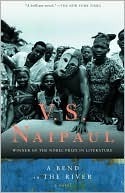More on this book
Community
Kindle Notes & Highlights
The river and the forest were like presences, and much more powerful than you. You felt unprotected, an intruder.
In the deepest forest was the greatest security.
And that was true. His attitude, since he had begun to feel towards a character, was that I owed him something, simply because I seemed willing to help.
I thought: Nothing stands still. Everything changes. I will inherit no house, and no house that I build will now pass to my children. That way of life has gone. I have lost my twenties, and what I have been looking for since I left home hasn’t come to me. I have only been waiting. I will wait for the rest of my life.
I was homesick, had been homesick for months. But home was hardly a place I could return to. Home was something in my head. It was something I had lost. And in that I was like the ragged Africans who were so abject in the town we serviced.
He altered. He lost the brightness and gaiety of the servant who knows that he will be looked after, that others will decide for him; and he lost what went with that brightness—the indifference to what had just happened, the ability to forget, the readiness for every new day.
You can go back many times to the same place. And something strange happens if you go back often enough. You stop grieving for the past. You see that the past is something in your mind alone, that it doesn’t exist in real life. You trample on the past, you crush it. In the beginning it is like trampling on a garden. In the end you are just walking on ground. That is the way we have to learn to live now. The past is here.”
“We have to learn to trample on the past, Salim.
“He had little to tell me, though. And I had less to tell him. I had hardly looked at the world. I didn’t know how it worked or what I might do in it. After my three unamazed student years, I was overwhelmed by my ignorance;
My dark-suited interviewer became impatient. He said, ‘Good heavens, man! You must give me some guidance. You must have some idea of the kind of job you see yourself doing.’
With each job description I read, I felt a tightening of what I must call my soul. I found myself growing false to myself, acting to myself, convincing myself of my rightness for whatever was being described. And this is where I suppose life ends for most people, who stiffen in the attitudes they adopt to make themselves suitable for the jobs and lives that other people have laid out for them.
“For the first time in my life I was filled with a colonial rage. And this wasn’t only a rage with London or England; it was also a rage with the people who had allowed themselves to be corralled into a foreign fantasy.
“I began to understand at the same time that my anguish about being a man adrift was false, that for me that dream of home and security was nothing more than a dream of isolation, anachronistic and stupid and very feeble. I belonged to myself alone. I was going to surrender my manhood to nobody. For someone like me there was only one civilization and one place—London, or a place like it. Every other kind of life was make-believe. Home—what for? To hide? To bow to our great men? For people in our situation, people led into slavery, that is the biggest trap of all. We have nothing. We solace
...more
It is better to withdraw from the whole business, if you can.
I would have found some kind of hole and tried to hide or pass. After all, we make ourselves according to the ideas we have of our possibilities. I would have hidden in my hole and been crippled by my sentimentality, doing what I was doing, and doing it well, but always looking for the wailing wall. And
You see, Salim, in this world beggars are the only people who can be choosers. Everyone else has his side chosen for him.
The Rothschilds are what they are because they chose Europe at the right time. The other Jews, just as talented, who went to bank for the Ottoman Empire, in Turkey or Egypt or wherever, didn’t do so well. Nobody knows their names. And that’s what we’ve been doing for centuries. We’ve been clinging to the idea of defeat and forgetting that we are men like everybody else.
We’ve been choosing the wrong side. I’m tired of being on the losing side. I don’t want to pass. I know exactly who I am and where I stand in the world. But now I want to win and win and win.”
“You live your life. A stranger appears. He is an encumbrance. You don’t need him. But the encumbrance can become a habit.”
He said, “In a situation like this you can’t spend all your time being frightened. Something may happen, but you must make yourself think of it as a bad road accident. Something outside your control, that can happen anywhere.”
Men lived to acquire experience; the quality of the experience was immaterial; pleasure and pain—and above all, pain—had no meaning; to possess pain was as meaningless as to chase pleasure.
It made me feel that after all these years I had never caught up with him, and never would; that my life would always be unsatisfactory.
Naz’ says Indar’s become help-resistant.
There could be no going back; there was nothing to go back to. We had become what the world outside had made us; we had to live in the world as it existed.


